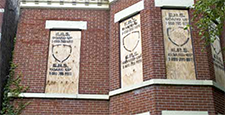Updated 9 March 2024
If the city of Chicago succeeds in raising its real estate transfer tax, how, exactly, will it use the funds?
Inside Chicago Government has published details of the proposed implementation plan, which has not been widely available.
Background: On Nov. 7 of 2023, the Chicago City Council passed a law that would put a referendum question on Chicago ballots for the state's March 2024 primary election. The question would ask voters whether the city may increase the real estate transfer tax (RETT) on properties that sell for $1 million or more.
According to the referendum ordinance, "the additional revenue . . . shall be deposited in a fund"—called the Bring Chicago Home Fund—"to be dedicated to combating homelessness, including providing permanent affordable housing and the services necessary to obtain and maintain permanent housing."
The ordinance spells out the referendum question as it should appear on voters' ballots.
Critics of the RETT increase, however, have objected that the referendum ordinance doesn't say exactly how the city will spend the additional money—nor does it say who will make those decisions. According to state law, those details require a separate implementation ordinance, to be passed later by the City Council if voters approve the referendum.
And, in fact, a draft of the implementation ordinance for the Bring Chicago Home Fund was made public last year—but it's buried at the end of a 41-page agenda for the Oct. 4 meeting of the full City Council.
So, who will decide how to spend the additional RETT money?
According to the draft implementation ordinance, the mayor "shall appoint, by and with the advice and consent of the City Council, fifteen voting Advisory Board members." The board will also have eight non-voting members.
The draft ordinance goes on to say that the city's budget director, "in consultation with relevant City departments and the Advisory Board, shall determine the maximum amount of funds from the Bring Chicago Home Fund to be included in the budget recommendation for eligible uses." It orders the budget director to "make reasonable efforts to minimize the potential for disruption to people experiencing or at risk of homelessness."
Further, the draft ordinance says that the city may spend the increased RETT funds on "non-congregate [shelter] models, discrete capital costs for existing congregate shelter, beds for severe or extreme weather, and increasing operational rates to support pay equity for shelter employees and to expand operations from traditional overnight to 24-hour shelter models."
In February, after the Bring Chicago Home Fund question began appearing on vote-by-mail ballots, a Cook County Circuit Court judge ordered that the votes should not be counted—the result of a lawsuit brought by groups representing realtors, builders, and building owners. The groups say the RETT increase will stifle development and suppress sales.
The administration of Mayor Brandon Johnson, however, got the judge's ruling reversed by an appellate court.






